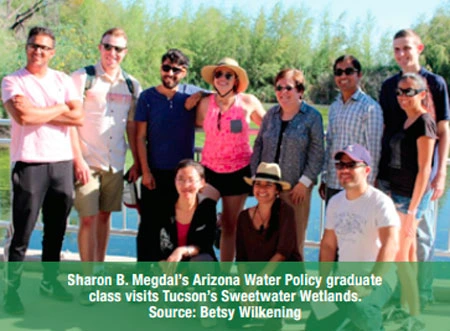Public Policy Review

One of the highlights of the graduate course in Arizona Water Policy I teach each Spring semester is our class field trip. The annual outing provides students with the opportunity to see in practice what we have been exploring in the classroom and through readings. This year’s field trip, conducted on March 27, 2015, included stops at Tucson Water’s Advanced Oxidation Plant for removing localized groundwater contaminants, the Southern Avra Valley Storage and Recovery Project for recharging Colorado River water for current and future use, and the Sweetwater Wetlands for further processing of treated wastewater. Each site represents an important component of Tucson Water’s water supply portfolio and overall groundwater management strategy. In addition, the students visited Central Arizona Project’s Twin Peaks Pumping Station, where they saw the CAP canal and the pumps that push water uphill. They also visited Pima County’s new Agua Nueva Water Reclamation Facility, which replaced the old (and smelly!) Roger Road Wastewater Treatment Plant and where they saw modern lab facilities used for water quality monitoring. In addition to packing all of this into a one-day field trip, a lunch hosted by BKW Farms provided the group with an opportunity to hear about how growers in the region have re-introduced production of organic White Sonora Wheat, originally brought to the region in late 17th century.
My Arizona Water Policy class uses Arizona water as the basis for examining water policy and management options for states and regions beyond our own. Throughout the semester, external experts serve as guest lecturers, and each student must write a paper for the course that explores a particular waterrelated challenge and policy approaches to resolving it. The guest experts cover timely topics, including water banking and Colorado River shortage, water quality regulations and policy, municipal water planning, agricultural water use, and sustainable water practices at multiple geographic scales. As evidence of the relevance of the course to students in many disciplines and programs, five academic programs at the University of Arizona list the course. This cross listing is consistent with the widespread recognition that addressing water issues in practice requires a multi-disciplinary approach. Course size is limited to 15 in order to enable a truly interactive and participatory experience throughout the semester.
This course is just one of many choices included in the curriculum for a relatively new graduate program at the University of Arizona, the Master’s degree program in Water, Society, and Policy. In order to help prepare them for jobs in public agencies, private businesses, and nongovernmental organizations, the program offers students considerable choice of coursework. In lieu of a researchbased thesis, the program’s capstone requirement is a six unit Master’s Project. As noted in the brochure for the program: “All students complete a Master’s Project selected in consultation with a faculty advisor. Projects are as unique and diverse as the students that participate in this program. [The student] may produce a professional paper, internship report, series of public presentations, public outreach activity with associated background materials, water-focused curriculum, or other substantive product.”
This Master’s Project connects the student with an external organization with which to work for a minimum of 270 hours on aspects of water management and policy important to the host entity. Students have connected with a diverse set of organizations. I assist my students in identifying a potential host and in reviewing the “scope of work” developed in consultation with the host. Students have connected with different types of organizations, including a large city, a grassroots sustainability coalition, a business-oriented water coalition, and a foreign scientific research institute. Project work is finalized by a summary report to the student’s advisor and a final presentation, which is open to faculty and students involved in the program, the project host, and invited guests. In order to provide additional learning outside the formal classroom, students in the Water, Society and Policy program must also take two semester-long seminars open only to students in the program. In the Spring semester, when I am responsible for the seminar, students attend water-related seminars and lectures offered by schools, departments, and programs across the University of Arizona and then meet as a small group to discuss them. Many of the seminar speakers are water management practitioners.
Feedback confirms that connecting students with those who focus day-in and day-out on the many water management challenges we face at the community, regional, national, and international levels is valued by all involved. Developing and implementing solutions to the myriad water challenges will require contributions from many disciplines and organizations and meaningful interaction among us all.

